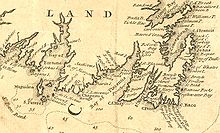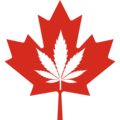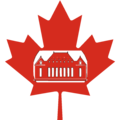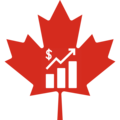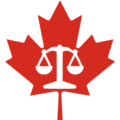Portal:Canada
| Showcase | Contents | Contributing |
Introduction
Canada is a country in North America. Its ten provinces and three territories extend from the Atlantic Ocean to the Pacific Ocean and northward into the Arctic Ocean, making it the world's second-largest country by total area, with the world's longest coastline. Its border with the United States is the world's longest international land border. The country is characterized by a wide range of both meteorologic and geological regions. With a population of just over 41 million people, it has widely varying population densities, with the majority residing in urban areas and large areas of the country being sparsely populated. Canada's capital is Ottawa and its three largest metropolitan areas are Toronto, Montreal, and Vancouver.
A developed country, Canada has a high nominal per capita income globally and its advanced economy ranks among the largest in the world by nominal GDP, relying chiefly upon its abundant natural resources and well-developed international trade networks. Recognized as a middle power, Canada's strong support for multilateralism and internationalism has been closely related to its foreign relations policies of peacekeeping and aid for developing countries. Canada promotes its domestically shared values through participation in multiple international organizations and forums. (Full article...)
Featured article -
The Newfoundland expedition was a naval raiding expedition led by English Captain John Leake between August and October 1702 that targeted French colonial settlements on the North Atlantic island of Newfoundland and its satellite, Saint Pierre. The expedition occurred in the early days of Queen Anne's War, as the North American theater of the War of the Spanish Succession is sometimes known. (Full article...)
Current events
- March 27, 2025 – Tariffs in the second Trump administration
- 2025 United States trade war with Canada and Mexico
- Canadian Prime Minister Mark Carney says a 25% tariff on automotive imports to the United States is a "direct attack" on his country by the Trump administration and vows to respond. (AP)
- March 22, 2025 – 2025 Trident Aviation DHC-5 crash
- A de Havilland Canada DHC-5 Buffalo cargo plane en route from Dhobley Airport in Lower Juba, Jubaland, to Aden Adde International Airport in Somalia’s capital city, Mogadishu, crashes in the Ceel Xabaaloow settlement in Lower Shabelle, South West State, killing all five Kenyan crew members on board. (Somalia Civil Aviation Authority) (Idil News)
- March 14, 2025 – 2025 Liberal Party of Canada leadership election
- Mark Carney is sworn in as the 24th Prime Minister of Canada. (CBC News)
- March 12, 2025 – 2025 United States trade war with Canada and Mexico, Canada–United States relations
- Canadian finance minister Dominic LeBlanc announces retaliatory tariffs on CAD$29.8 billion (US$20.7 billion) of goods from the United States after U.S. president Donald Trump announced additional tariffs on Canadian metals. (DW)
- March 11, 2025 – 2025 United States trade war with Canada and Mexico
- U.S. President Donald Trump announces that he will raise tariffs on Canadian steel and aluminium imports from 25% to 50%. (BBC News)
Selected panorama -
National symbol -

A mari usque ad mare (Latin: [aː ˈmariː ˈuːskᶣɛ ad ˈmarɛ]; French: D'un océan à l'autre, French pronunciation: [dœ̃nɔseˈã aˈloʊ̯tʁ]; English: From sea to sea) is the Canadian national motto. The phrase comes from the Latin Vulgate translation of Psalm 72:8 in the Bible: (Full article...)
Selected vital article -

Canadian values are the perceived commonly shared ethical and human values of Canadians. The majority of Canadians believe they share specific values, with a plurality identifying human rights, respect for the law and gender equality as colective principles. Canadians generally exhibit pride in equality before the law, fairness, social justice, freedom, and respect for others; while often making personal decisions based on self interests rather than a collective Canadian identity. Tolerance and sensitivity hold significant importance in Canada's multicultural society, as does politeness. Historian Ian MacKay associates Canadian values with egalitarianism, equalitarianism and peacefulness. (Full article...)
Selected picture -
Featured biography -
Neil Ellwood Peart (/pɪərt/ PEERT; September 12, 1952 – January 7, 2020) was a Canadian and American musician, known as the drummer, percussionist, and primary lyricist of the rock band Rush. He was known to fans by the nickname "the Professor", derived from the Gilligan's Island character of the same name. His drumming was renowned for its technical proficiency and his live performances for their exacting nature and stamina. Peart earned numerous awards for his musical performances, including an induction into the Modern Drummer Readers Poll Hall of Fame in 1983 at the age of thirty, making him the youngest person ever so honoured. (Full article...)
Did you know -

- ... that according to Modern Times, a San Francisco–based bookstore collective, if there was only one book that you read in 1975 it had to be Canadian author and activist Helen Potrebenko's Taxi!?
- ... that Jonathan Beaulieu-Richard retired from the Canadian Football League to become a pharmacist?
- ... that Canadian singer Tate McRae is a trained ballet dancer and started her musical career by accident?
- ... that Chuck Eisenmann went from professionally pitching in baseball to owning and training the dogs that starred on the Canadian television series The Littlest Hobo?
- ... that Canadian professional ice hockey player Larry Jeffrey had eleven knee surgeries in a span of nine years?
- ... that Canadian football player Nicholas Dheilly tied his team's single-game sack record in his debut?
- ... that Canadian architect Barry Downs contributed to the redevelopment of the Expo 86 site in Vancouver, the largest private development in North America at the time?
Featured list -
Canada is a federation that comprises ten provinces and three territories. Its government is structured as a constitutional monarchy and a parliamentary democracy, with a monarch as its sovereign and a Prime Minister as its head of government. Each of the country's provinces and territories also has a head of government, called premier in English. Collectively, the federal Prime Minister and provincial and territorial premiers are referred to as first ministers. In French, the term premier ministre is used in both the federal and provincial/territorial contexts. (Full article...)
Main articles
Associated Wikimedia
The following Wikimedia Foundation sister projects provide more on this subject:
-
Commons
Free media repository -
Wikibooks
Free textbooks and manuals -
Wikidata
Free knowledge base -
Wikinews
Free-content news -
Wikiquote
Collection of quotations -
Wikisource
Free-content library -
Wikiversity
Free learning tools -
Wikivoyage
Free travel guide -
Wiktionary
Dictionary and thesaurus



